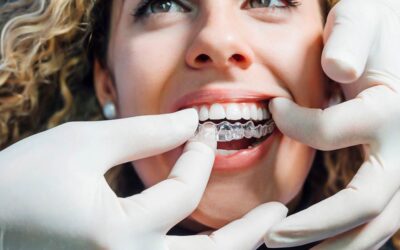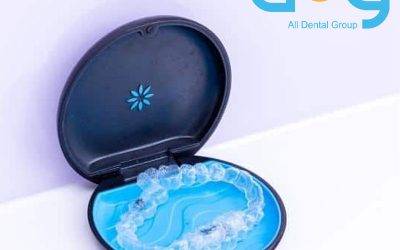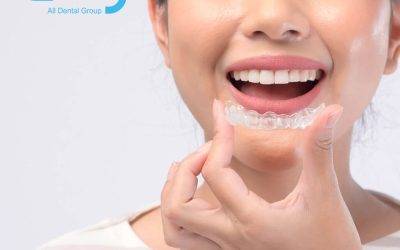Can Invisalign cause headaches?
The decision to wear Invisalign is often one of the best I have ever made. However, there are some side effects that come with wearing this dental device. Can Invisalign cause headaches? The answer is yes, but not in all cases. If you’re experiencing a headache while wearing your aligners, please read on for more information about why this happens and what you can do about it!
Headaches are common when wearing Invisalign.
It is not uncommon to experience headaches when wearing Invisalign. In fact, a headache can be one of the most common side effects.
While it may seem like a cause for concern, headaches are actually quite common with Invisalign and are not generally due to any medical issues. If you are experiencing more than just mild discomfort or pain, contact your doctor so that they can determine what other conditions could be contributing to your head aches. Headaches could also be a sign of sinusitis which is often more involved and requires more advanced treatment such as antibiotics or surgery.
Over-the-counter medications may help deal with mild headaches caused by wearing braces; however if you have persistent head pain resulting from your Invisalign aligners then consult with your dentist or doctor who may suggest alternative treatments besides prescription drugs.
Become a part of our
Miami Lakes Family Dentist
Whether you have an emergency or would like to speak to somebody about a smile makeover, there’s a fast and easy way to schedule your next appointment.
Have Any Questions?
Call Us Today at: (305) 512-0066
In most cases, this is not a cause for concern. However, severe headaches may be a sign of Sinusitis which is often more involved and requires more advanced treatment.
In most cases, this is not a cause for concern. However, severe headaches may be a sign of Sinusitis which is often more involved and requires more advanced treatment.
Sinus pain can be a symptom of Sinusitis which is an infection of the sinuses. It’s characterized by facial swelling and pressure, as well as headaches and postnasal drip. If you experience these symptoms along with your headaches, it’s important to see your dentist or physician for further evaluation so that appropriate treatment can begin immediately to prevent complications from occurring later on.
Over-the-counter medications like ibuprofen or acetaminophen (Tylenol) can help ease both types of pain (headaches and sinus pressure).
The good news is that this type of headache is related to clenching and myofascial pain disorder (MPD) .
The good news is that this type of headache is related to clenching and myofascial pain disorder (MPD).
What is myofascial pain disorder? MPD occurs when there are muscle knots or trigger points in your muscles. These tense spots cause a buildup of lactic acid, which causes pain and tenderness. If you experience these symptoms for over three months on a regular basis, you may have MPD.
What causes myofascial pain disorder? It’s likely that there are multiple factors that contribute to your MPD: genetics, lifestyle habits such as poor posture while working at a computer or smartphone, stress levels and even dental problems such as bruxism (also known as tooth grinding). Stress is one of the leading causes of these headaches because it can make them worse over time when untreated properly through treatment methods including physical therapy sessions with a licensed physical therapist who specializes in treating patients with chronic headaches caused by muscle tension issues like MPD.”
Your dentist will be able to recommend over the counter medications to deal with mild headaches and sinus pain, as well as providing expert advice on how best to use them.
If you are experiencing mild headaches and sinus pain, your dentist will be able to recommend over-the-counter medications to deal with it. They may also provide expert advice on how best to use these medications, depending on the nature of your symptoms.
For example, if a patient has mild headaches that are caused by dehydration and sinus blockage due to allergies, an antacid can help relieve these symptoms. If the patient is suffering from more severe headaches or chronic pain, however, then stronger prescription medication may be required in order for them to feel better again.
If your symptoms persist despite using any of these treatments from your dentist or using over-the-counter medications yourself then it’s recommended that you see them again as soon as possible so they can determine if something else might be wrong with you physically before making changes regarding treatment options available at their practice such as Invisalign aligners
If you have questions about your Invisalign treatment or experience symptoms like these, please feel free to contact our office right away by calling (305) 512-0066.
If you have questions about your Invisalign treatment or experience symptoms like these, please feel free to contact our office right away by calling (305) 512-0066. Or, if you prefer, you can schedule an appointment online. Whatever works best for you!
If we can help with any other information or assistance during this process in any way, please let us know. We are here to help and look forward to working with you.
Oral Health Blog
When Will You Feel the Most Discomfort with Invisalign?
When Will You Feel the Most Discomfort with Invisalign?Imagine embarking on a journey towards the perfect smile, a path that promises a future of confidence and joy with every grin. This road, paved...
The Impact of Changing Invisalign Trays Too Soon
The Impact of Changing Invisalign Trays Too Soon: Insight from a Top Dentist in Miami LakesDid you know that accelerating your Invisalign timeline could actually be setting back your smile journey?...
Transforming Smiles and Halting Teeth Grinding
Transforming Smiles and Halting Teeth Grinding: Discover the Power of Invisalign with Dr. Gherbali!Do you wake up in the mornings with a headache or a sore jaw? Perhaps you've noticed that your...
Overcoming Dental Issues with Invisalign – A Journey of Smiles Reclaimed
Overcoming Dental Issues with Invisalign – A Journey of Smiles ReclaimedHave you ever hidden your smile in photographs or felt self-conscious about your teeth during a conversation? If the answer is...
Debunking Myths about Invisalign: A Comprehensive Insight for Your Perfect Smile
Debunking Myths about Invisalign: A Comprehensive Insight for Your Perfect SmileEver since its introduction in 1997, Invisalign has been a game-changer in the world of orthodontics. Despite its...
Do you have to wear a retainer forever after Invisalign?
Do you have to wear a retainer forever after Invisalign?You've done it! You've followed all of your Invisalign's instructions, and you now have straight teeth. But don't you want to keep them that...
Dentists Proudly Serving
Miami Lakes
Whether you have an emergency or would like to speak to somebody about a smile makeover, there’s a fast and easy way to schedule your next appointment.
Have Any Questions?
Call Us Today at: (305) 512-0066







